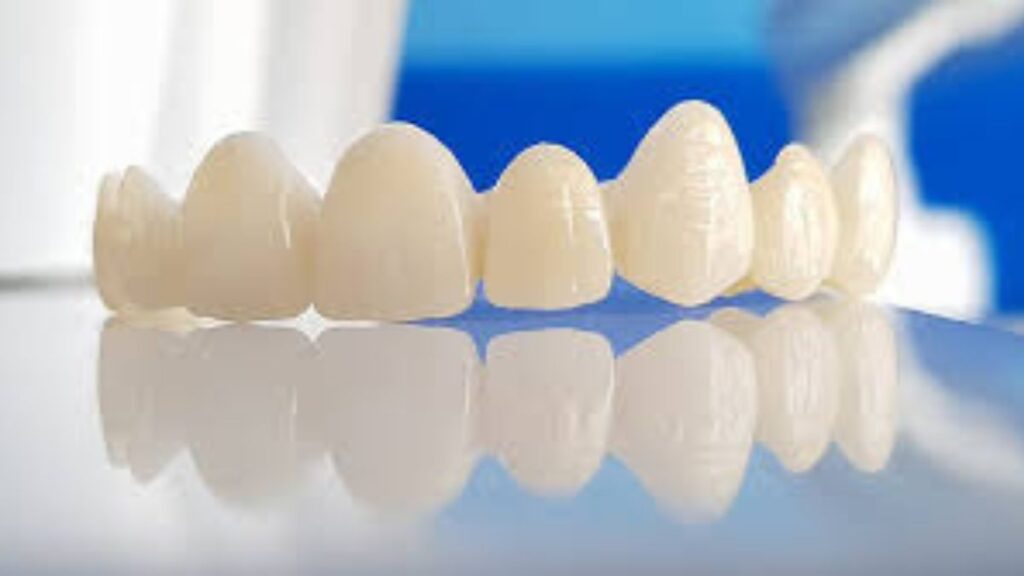Dental crowns are one of the most common restorative solutions in treating weak or broken teeth. Crowns cover the tooth and protect it from further damage, helping you chew your food well.
Different types of source materials have been used to design crowns. These materials traditionally include metal and porcelain or a combination of metal and porcelain.
Recently, newer materials have also been introduced to craft dental crowns for better results. However, one material that is gaining significant popularity is zirconia.
Zirconia crowns are strong, durable, and biocompatible crowns, which makes them a popular choice for many dental patients. But what exactly are zirconia crowns, and why should you consider them for your dental treatment?
Let’s explore.
What Are Zirconia Crowns?
A zirconia crown is a dental crown sourced from a very strong material, which is zirconium dioxide.
Zirconia is a ceramic material, which makes it biocompatible, and it is used in modern dentistry for restoring teeth.
Zirconia crowns can be used for a single tooth or as part of a larger restoration like a multi-unit bridge.
Zirconia crowns are different from traditional metal crowns and porcelain crowns in a few important ways.
Zirconia crowns have no metal, making them a good choice for patients who are sensitive to metal.
Also, they tend to be much stronger than porcelain, making them an ideal option for patients who need a crown that bears the intense pressure of chewing.
Reasons to Get a Zirconia Crown
Some of the main reasons you might want to consider getting a zirconia crown include:
Strength and Durability
Zirconia crowns are strong; they can withstand the high forces of chewing, making them ideal for back teeth, where biting forces are greater.
Long-Lasting
With good care and oral hygiene habits, zirconia crowns can last between 10 and 15 years or even longer, making them a great long-term treatment for your dental health.
Biocompatibility
Zirconia is a biocompatible material, which means it is safe to use and does not irritate the oral soft tissues. This makes it a reliable option for most patients, especially those with sensitive gums or allergies to metal.
Aesthetic Appeal
Newer techniques allow for better customization of zirconia crowns as they are opaque.
Many dental labs now use layering techniques with porcelain or other materials to make it look more natural.
This is especially helpful for front teeth, where aesthetics are more important.
Same-Day Procedure
Technologies like CAD/CAM (Computer-Aided Design/Computer-Aided Manufacturing) help dentists design a crown during your appointment.
This can be possible when dental offices are equipped with advanced technology that allows them to create zirconia crowns in-house on the same day.
Gentler on Opposing Teeth:
Zirconia crowns tend to cause less wear on the opposing teeth compared to porcelain or metal crowns. This is an important consideration for patients with teeth that are already worn out.
Disadvantages of Zirconia Crowns
Despite all their benefits, zirconia crowns do have a few potential downsides to keep in mind:
Aesthetic Limitations
Generally, zirconia crowns are more opaque than porcelain crowns, which can make it harder to match the natural colour of your teeth, particularly in the front teeth cases.
Hence, it may not be considered as the first choice of material for aesthetic makeovers.
However, recent advancements in zirconia technology have helped resolve this issue, and dentists can now use staining and glazing techniques to improve the appearance of zirconia crowns.
Higher Cost
Zirconia crowns tend to be more expensive than other types of crowns, such as porcelain or metal. The cost depends on factors like the location of the dental clinic, the dentist’s experience, and the complexity of your case.
How Long Do Zirconia Crowns Last?
Zirconia crowns are known for their longevity. On average, these crowns can last anywhere from 10 to 15 years or more, depending on factors like oral hygiene and the amount of wear they experience.
However, habits like teeth grinding, biting hard objects, or poor dental hygiene can shorten the lifespan of your crown.
Caring for Your Zirconia Crown
To ensure your zirconia crown lasts as long as possible, follow these basic care tips:
- Brush your teeth at least twice a day using a fluoride toothpaste.
- Floss daily to remove plaque and food particles that can cause decay.
- Avoid habits like chewing on ice, pens, or hard candies, which can damage your crown.
- Visit your dentist regularly for checkups and cleanings to ensure your crown and surrounding teeth remain in good condition.
ALSO READ: Maximize Your Fun: EngineOwning Game Cheats
Conclusion
Zirconia crowns are a durable, aesthetic, and biocompatible option for many dental patients. They offer benefits such as strength, longevity, and the ability to withstand the forces of chewing.
If you’re considering a dental crown, it would be wise to talk to your dentist about whether zirconia is the right choice for you. They will ensure you get the best possible treatment for your oral health needs.






